-
11/24/25 Health News: Statement Regarding Vaccines and Autism
On November 21 the Department of Health and the West Coast Health Alliance issued statements regarding vaccines and autism. In short, vaccines are thoroughly tested and remain one of the most important tools we have for preventing infectious diseases. They represent one of the greatest public health achievements in history, having saved millions of lives…

